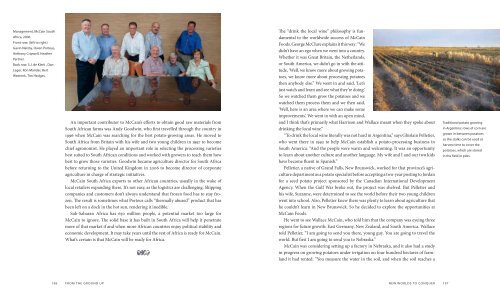From the Ground Up - McCain Foods Limited
From the Ground Up - McCain Foods Limited
From the Ground Up - McCain Foods Limited
You also want an ePaper? Increase the reach of your titles
YUMPU automatically turns print PDFs into web optimized ePapers that Google loves.
Management, <strong>McCain</strong> South<br />
Africa, 2006.<br />
Front row: (left to right)<br />
Gavin Naisby, Owen Porteus,<br />
Anthony Cripwell, Hea<strong>the</strong>r<br />
Partner.<br />
Back row: S.J. de Klerk , Dan<br />
Leger, Ron Mander, Bert<br />
Weenink, Tim Hedges.<br />
An important contributor to <strong>McCain</strong>’s efforts to obtain good raw materials from<br />
South African farms was Andy Goodwin, who first travelled through <strong>the</strong> country in<br />
1996 when <strong>McCain</strong> was searching for <strong>the</strong> best potato-growing areas. He moved to<br />
South Africa from Britain with his wife and two young children in 1997 to become<br />
chief agronomist. He played an important role in selecting <strong>the</strong> processing varieties<br />
best suited to South African conditions and worked with growers to teach <strong>the</strong>m how<br />
best to grow those varieties. Goodwin became agriculture director for South Africa<br />
before returning to <strong>the</strong> United Kingdom in 2006 to become director of corporate<br />
agriculture in charge of strategic initiatives.<br />
<strong>McCain</strong> South Africa exports to o<strong>the</strong>r African countries, usually in <strong>the</strong> wake of<br />
local retailers expanding <strong>the</strong>re. It’s not easy, as <strong>the</strong> logistics are challenging. Shipping<br />
companies and customers don’t always understand that frozen food has to stay frozen.<br />
The result is sometimes what Porteus calls “<strong>the</strong>rmally abused” product that has<br />
been left on a dock in <strong>the</strong> hot sun, rendering it inedible.<br />
Sub-Saharan Africa has 650 million people, a potential market too large for<br />
<strong>McCain</strong> to ignore. The solid base it has built in South Africa will help it penetrate<br />
more of that market if and when more African countries enjoy political stability and<br />
economic development. It may take years until <strong>the</strong> rest of Africa is ready for <strong>McCain</strong>.<br />
What’s certain is that <strong>McCain</strong> will be ready for Africa.<br />
The “drink <strong>the</strong> local wine” philosophy is fundamental<br />
to <strong>the</strong> worldwide success of <strong>McCain</strong><br />
<strong>Foods</strong>. George McClure explains it this way: “We<br />
didn’t have an ego when we went into a country.<br />
Whe<strong>the</strong>r it was Great Britain, <strong>the</strong> Ne<strong>the</strong>rlands,<br />
or South America, we didn’t go in with <strong>the</strong> attitude,<br />
‘Well, we know more about growing potatoes,<br />
we know more about processing potatoes<br />
<strong>the</strong>n anybody else.” We went in and said, ‘Let’s<br />
just watch and learn and see what <strong>the</strong>y’re doing.’<br />
So we watched <strong>the</strong>m grow <strong>the</strong> potatoes and we<br />
watched <strong>the</strong>m process <strong>the</strong>m and we <strong>the</strong>n said,<br />
‘Well, here is an area where we can make some<br />
improvements.’ We went in with an open mind,<br />
and I think that’s primarily what Harrison and Wallace meant when <strong>the</strong>y spoke about<br />
drinking <strong>the</strong> local wine.”<br />
“To drink <strong>the</strong> local wine literally was not hard in Argentina,” says Ghislain Pelletier,<br />
who went <strong>the</strong>re in 1992 to help <strong>McCain</strong> establish a potato-processing business in<br />
South America. “And <strong>the</strong> people were warm and welcoming. It was an opportunity<br />
to learn about ano<strong>the</strong>r culture and ano<strong>the</strong>r language. My wife and I and our two kids<br />
have become fluent in Spanish.”<br />
Pelletier, a native of Grand Falls, New Brunswick, worked for that province’s agriculture<br />
department as a potato specialist before accepting a two-year posting to Jordan<br />
for a seed potato project sponsored by <strong>the</strong> Canadian International Development<br />
Agency. When <strong>the</strong> Gulf War broke out, <strong>the</strong> project was shelved. But Pelletier and<br />
his wife, Suzanne, were determined to see <strong>the</strong> world before <strong>the</strong>ir two young children<br />
went into school. Also, Pelletier knew <strong>the</strong>re was plenty to learn about agriculture that<br />
he couldn’t learn in New Brunswick. So he decided to explore <strong>the</strong> opportunities at<br />
<strong>McCain</strong> <strong>Foods</strong>.<br />
He went to see Wallace <strong>McCain</strong>, who told him that <strong>the</strong> company was eyeing three<br />
regions for future growth: East Germany, New Zealand, and South America. Wallace<br />
told Pelletier, “I am going to send you <strong>the</strong>re, young guy. You are going to travel <strong>the</strong><br />
world. But first I am going to send you to Nebraska.”<br />
<strong>McCain</strong> was considering setting up a factory in Nebraska, and it also had a study<br />
in progress on growing potatoes under irrigation on four hundred hectares of farmland<br />
it had rented. “You measure <strong>the</strong> water in <strong>the</strong> soil, and when <strong>the</strong> soil reaches a<br />
196 <strong>From</strong> <strong>the</strong> GrouN d up<br />
New w orlds to CoN quer 197<br />
Traditional potato growing<br />
in Argentina: rows of corn are<br />
grown in between potatoes<br />
so <strong>the</strong> stalks can be used at<br />
harvest time to cover <strong>the</strong><br />
potatoes, which are stored<br />
in <strong>the</strong> field in piles.






